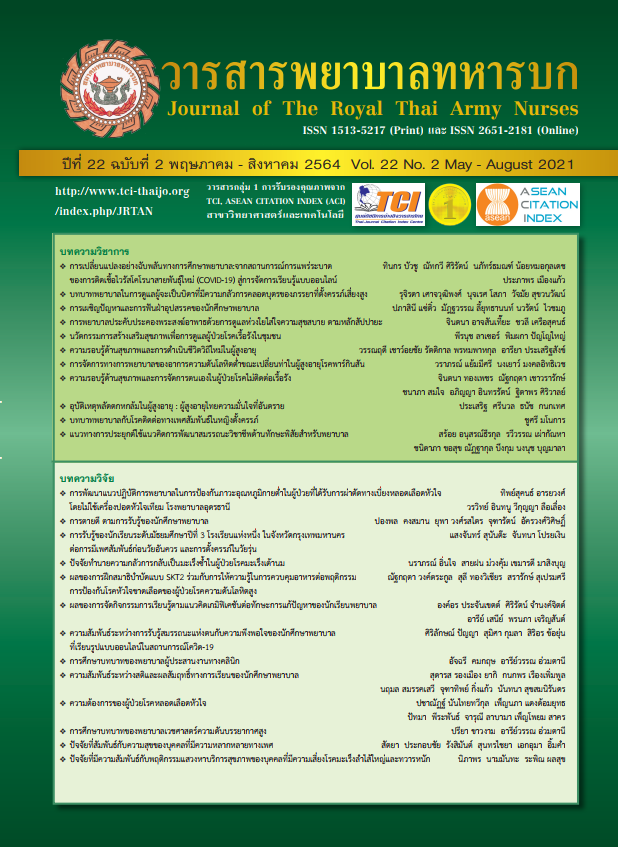Health Literacy and New Normal in Older Adults
Keywords:
Health literacy, New normal, Older adultsAbstract
Health literacy is a crucial factor that can lead a person to appropriate health behaviors, decrease risk of health problems, and is necessary to be continuously developed. Especially in the new normal era, which includes the improving of online social networking and technological skills are important to enhance one’s health literacy. The development of health literacy in older adults is limited due to functional decline; hearing and vision loss; learning and memory problems, including chronic illness and health care cost. These factors are barriers to access and utilize technology for older adults. This academic article aimed to review the evidence of health literacy and new normal lifestyle among older adults in order to understand and guide further study. Moreover, this can be applied in nursing practice for improving health care and quality of life in older adults.
Downloads
References
Wilson N, Kvalsvig A, Barnard LT, Bake MG. Case-fatality risk estimates for COVID-19 calculated by using a lag time for fatality. Emerging Infectious Diseases. 2020;26(6): 1339-40.
Seng JJB, Yeam CT, Huang CW, Tan NC, Low LL. Pandemic related health literacy-A systematic review of literature in COVID-19, SARS and MERS pandemics. medRxiv; 2020: 1-33.
Foundation of Thai Gerontology Research and Development institute. Situation of the Thai elderly 2019. Bangkok: Printery Company Limited; 2019. (in Thai)
Chesser AK, Woods NK, Smothers K, Rogers N, Health literacy and older adults: A systematic review. Gerontology and Geriatric Medicine. 2016;2:1-13.
Trainattawan W, Wirojratana V, Watanakukrilert D. Factors influencing health literacy among older adults. Journal of Health Science Research. 2019;13(2):41-51. (in Thai)
Serbim A, Paskulin L, Nutbeam D. Improving health literacy among older people through primary health care units in Brazil: feasibility study. Health Promotion International. 2020;35: 256-66.
Sørensen K, Van den Broucke S, Fullam J, Doyle G, Pelikan J, Slonska Z, et al. Health literacy and public health: A systematic review and integration of definitions and models. BMC Public Health. 2012;12(80):1-13.
Commission of the European Communities. Together for health: A strategic approach for the Eu 2008-2013, white paper. Brussels: COM; 2007.
Nutbeam D. The evolving concept of health literacy. Social Science & Medicine. 2008; 67(12):2072-8.
Pengjuntr W. Health literacy. Proceedings of the Department of Health’s personnel potential development; 2017 Feb 1; Department of Health, Ministry of Public Health. Nontaburi: Ministry of Public Health; 2017. (in Thai)
World Health Organization. United nations development program. policy brief 4: Health literacy. In: 9th Global Conference on Health Promotion. Geneva: World Health Organization; 2016. p.1-9.
Supriyati S, Anggraeny DK, Carissa TM, Sheila AP, Qisthi SA, Rianti M, et al. Preparing new normal: The health literacy assessment on the Covid-19. Berita Kedokteran Masyarakat. 2021;37(1):27-32.
Liu YB, Chen YL, Xue HP, Hou P. Health literacy risk in older adults with and without mild cognitive impairment. Nursing Research. 2019;68(6):433-8.
Wells TS, Rush SR, Nickels LD, Wu L, Bhattarai GR, Yeh CS. Limited health literacy and hearing loss among older adults. Health Literacy Research and Practice. 2020;
Wuthirangsi A. Digital Literacy of Elderly. Interdisciplinary studies journal. 2021; 21(1):1-17. (in Thai)
Liu YB, Hou P, Xue HP, Mao X, Li YN. Social support, health literacy, and health care utilization among older adults. Asia Pacific Journal of Public Health. 2019;31(4):359-66.
Shiratsuchi D, Makizako H, Nakai Y, Taniguchi Y, Akanuma T, Yokoyama K, et al. Association of health literacy with the implementation of exercise during the declaration of COVID-19 state of emergency among Japanese community-dwelling old-old adults. International Journal of Environmental Research and Public Health. 2021;18(4). 1-9.
Leung AYM, Parial LL, Tolabing MC, Sim T, Mo P, Okan O, et al. Sense of coherence mediates the relationship between digital health literacy and anxiety about the future in aging population during the COVID-19 pandemic: A path analysis. Aging and Mental Health. 2021:1-10.
Do BN, Nguyen PA, Pham KM, Nguyen HC, Nguyen MH, Tran CQ, et al. Determinants of health literacy and its associations with health-related behaviors, depression among the older people with and without suspected COVID-19 symptoms: A multi-institutional study. Frontiers in Public Health. 2020;8:1-9.
Nguyen TT, Le NT, Nguyen MH, Pham LV, Do BN, Nguyen HC, et al. Health literacy and preventive behaviors modify the association between pre-existing health conditions and suspected COVID-19 symptoms: A multiinstitutional survey. International Journal of Environmental Research and Public Health. 2020;17(22):1-12.
Okan O, Bollweg TM, Berens E-M, Hurrelmann K, Bauer U, Schaeffer D. Coronavirus-related health literacy: A cross-sectional study in adults during the COVID-19 infodemic in Germany. International Journal of Environmental Research and Public Health. 2020;17(15):1-20.
Wong JYH, Wai AKC, Zhao S, Yip F, Lee JJ, Wong CKH, et al. Association of individual health literacy with preventive behaviours and family well-being during COVID-19 pandemic: mediating role of family information sharing. International Journal of Environmental Research and Public Health. 2020;17(23):1-10.
Gautam V, S D, Rustagi N, Mittal A, Patel M, Shafi S, et al. Health literacy, preventive COVID 19 behaviour and adherence to chronic disease treatment during lockdown among patients registered at primary health facility in urban Jodhpur, Rajasthan. Diabetes & metabolic syndrome. 2021;15(1):205-11.
McCaffery KJ, Dodd RH, Cvejic E, Ayrek J, Batcup C, Isautier JM, et al. Health literacy and disparities in COVID-19-related knowledge, attitudes, beliefs and behaviours in Australia. Public Health Research and Practice. 2020; 30(4):1-9.
Duplaga M, Grysztar M. The Association between future anxiety, health literacy and the perception of the COVID-19 pandemic: A cross-sectional study. Healthcare. 2021;9(1):1-18.
Srisaeng P, Deenamjued W. Health literacy of healthy aging among elderly in Bangkok metropolitan: Development and validation of health literacy scale. Journal of The Royal Thai Army Nurses. 2019;20(2):340-50. (in Thai)
Brors G, Norman CD, Norekval TM. Accelerated importance of eHealth literacy in the COVID-19 outbreak and beyond. European Journal of Cardiovascular Nursing. 2020;19(6):458-61.
Downloads
Published
How to Cite
Issue
Section
License
บทความหรือข้อคิดเห็นใดใดที่ปรากฏในวารสารพยาบาลทหารบกเป็นวรรณกรรมของผู้เขียน ซึ่งบรรณาธิการหรือสมาคมพยาบาลทหารบก ไม่จำเป็นต้องเห็นด้วย
บทความที่ได้รับการตีพิมพ์เป็นลิขสิทธิ์ของวารสารพยาบาลทหารบก
The ideas and opinions expressed in the Journal of The Royal Thai Army Nurses are those of the authors and not necessarily those
of the editor or Royal Thai Army Nurses Association.






